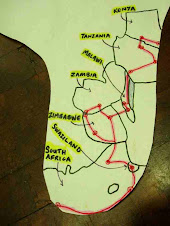Olin study group - finding similar stories as activists
Tonight I met a group of people who were asking very similar questions as I have been:
* What does it mean to be an activist driven by direct suffering vs. driven by ideas?
* Activists are fragmented; everyone has their own agenda. What do we do about this?
* Many activists jump from issue to issue, depending what's hot. The benefit: deal with current crisis. Cost: don't always get deeper into roots and longer term solutions. Is this shortsighted? Would it be a radical act to plant roots and stay focused on one place? (Note: Brad Lancaster in Tucson is my hero because he did just that)
* Do we need place-based communities as well as issue-based communities?
* The Zapatistas said that you have to take risks to make deep change. They planned for ten years before they came out of the woods and declared their path towards an autonomous state. What does it mean to us in Portland or the U.S. to take a risk? What does it look like to get out of our comfort zone?
* We discussed "lifestylists", folks who work for social change through gardening, biking, eating vegan, etc. And we discussed the "intellectual activists", who sit around and study and debate all the time. And then there are the non-intellectual activists, who just want to go go go. And the burnt out activists, who "just want to live their life" and not go to meetings all the time. What's the balance?
* How do we find the time or interest in studying history? Other cultures have passed down history through songs, stories, lessons, etc. Today, we have Hollywood or CNN as the story tellers...
* If movement building tends to happen during times of crisis, and in those times we are not necessarily thinking the most clearly or long-termly, how do we motivate people to organize otherwise?
The group I attended was the monthly social movement study group called Olin. Their homework for this session was to read "Beyond Resistance: EVERYTHING! An Interview with Subcomandante Insurgente Marcos", of the Zapatistas in Chiapas, Mexico. Many interesting lessons can be drawn from the Zapatistas:
* Listening tour: show up and ask groups/people what they are doing. Learn and apply lessons from there. (see my blog entry from when I attended a Listening Tour event).
* "Encounters" or gatherings as a tool... create the space for interactions!
* Observation: an event with free food and music brings one type of crowd; an event with explicit political agenda brings another... both are hosted by the same group. How do we create events where multiple crowds are all attracted? Is one event more "activisty" than another? Many activist groups/social movements organize around community activities like food and other basic needs... the Black Panthers and the Zapatistas... are we "too busy having meetings" to build a foundation of community?
* Building "counter institutions" is essential: create the locally-powered alternative foundations for society.
I really enjoyed meeting another group of people who were not only experiencing similar things as me, but who were also articulating the experiences by asking questions and admitting that we don't know the answers. It seems like that's a good start.
And on that note, next month's homework reading may be: "Learning How To Ask" by Charles Briggs -- a recommended reading about the ins and outs of a good interview.


No comments:
Post a Comment